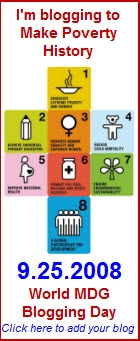Sometimes it can be frustrating to be Episcopalian and depend on the lectionary. In the wake of Hurricane Katrina, I found myself wanting to hear the story of Jesus calming the storm at sea, or a portion of Revelation, to hear the promises of the new heaven and earth, when God will wipe away the tears from our eyes. The end chapters of Paul’s letter to the Romans with its simple, practical lessons in common courtesy leave me wanting a bit more. The devastating pictures on the news, hearing from friends whose houses and churches have been lost, the worsening situation in New Orleans leave me wondering “Where is God in all this?” And I’m haunted by the simplest song: Ubi caritas et amor, ubi caritas, Deus ibi est.
What is true every day in our communities of faith is true in times of crisis and tragedy: God is present in the acts of genuine love we extend to one another.
And suddenly, the simple practical writings of Saint Paul shine as a beacon in a week of dark and sad stories. To see God at work in times like these we must let love be genuine – a simple instruction, perhaps, but certainly not an easy task.
The fast-paced life of modern America makes it hard for genuine love to flourish. The day to day busy-ness sometimes takes over, and we simply don’t see those opportunities to put love into action. In times of crisis and devastation such as we have seen this week in the aftermath of Hurricane Katrina, the temptation to turn away is even stronger. The pictures on TV and the stories of desperate people are overwhelming, even numbing after a while. When the devastation is so incomprehensible, it seems that there is little we can do to be of any help. But genuine love does not need enormous miracles of Biblical proportions to be put into action. Rather today’s Gospel reminds us that Jesus promises to be present whenever two or three gather in His name, when one child of God reaches out to another in genuine love.
First of all, this means walking through life “face first”, with our eyes and ears open to the world around us. Genuine love calls Christians to be present in all the moments that make up life: in the joys and the sorrows, in the celebrations and in the times of loss. How can we extend hospitality to strangers if haven’t noticed them sitting on our doorstep? How can we feed the hungry if we pass them by? We can only rejoice with those who rejoice and weep with those who weep when we open our eyes, and discover just who around us is weeping and who around us is rejoicing. Once love helps us see, we can take the time to stop and celebrate with the friend when she calls after her last radiation treatment, or sit and listen with the friend who just doesn’t know how to fix his difficult relationship with his teenager. It may not seems like much, but – as someone who has recently lost a family member – let me assure you that these moments are indeed holy.
This awareness of the world is weighty – which is why genuine love must be rooted in prayer, and perseveres only in prayer. In prayer and worship, we ground ourselves in the knowledge and love of God. That is why we come here every Sunday and gather together in worship: to remind each other and ourselves that nothing we do in the name of God is done alone. In our common prayer, we offer our cares to God, and remember that we are only vessels of God’s love, and witnesses to God’s presence in the world.
With our eyes opened and our spirits strengthened, we can name God at work in the world around us. And when the pain and loss of Hurricane Katrina seems too overwhelming, we can watch and wait and pray with the people of the Gulf Coast just a bit more. God will be present in all of these moments – and our genuine offers of love will guide us towards further action.
Because when we walk in genuine love, caring for those in need is a natural next step. Even if our actions seem small compared to the situations like our Southern neighbors face, acts of love point to God. Our catechism tells us that the mission of the Church is to restore people to unity with God: in a word, we are about reconciliation. Today’s Gospel lesson shows us how simple this can be. When one of us goes to another one in order to restore what has been broken, reconciliation – the mission of the Church – happens with just two people. So there really is so much we can do: over the next days and weeks, money can be donated to Episcopal Relief and Development, health kits and bottled water can be given, perhaps you may even be moved to help shelter refugees.
These actions help with immediate needs, but they do more than that. Genuine love gives birth to genuine hope: the hope that in good times, and in our darkest times, and even in death, we will never be separated from the love of God in Christ Jesus. When we who are the Body of Christ in this world, are willing to walk with people in their trouble, to serve in times of devastation and give what we have in times of crisis – we witness to the truth: Where true love and charity are, God is there. May our words, our actions during the comings weeks and throughout our lives be a witness to this simple truth.
Sunday, September 04, 2005
Subscribe to:
Post Comments (Atom)

No comments:
Post a Comment